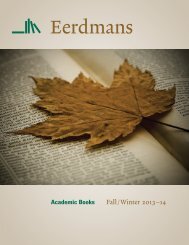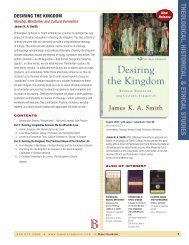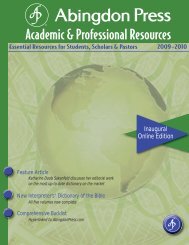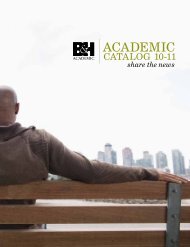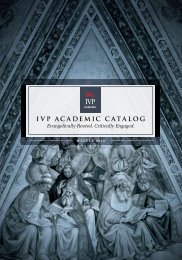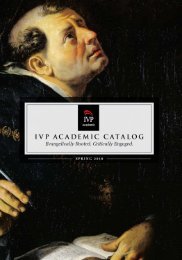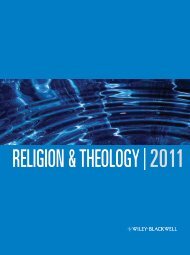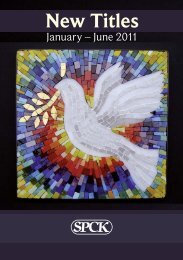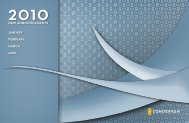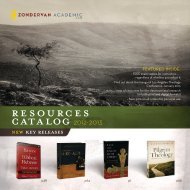koinonia
new releases
new releases
You also want an ePaper? Increase the reach of your titles
YUMPU automatically turns print PDFs into web optimized ePapers that Google loves.
Historical Theology & Church History<br />
Theologian Trading Cards<br />
norman jeune iii<br />
Patterned after the all-American baseball card, Theologian Trading Cards<br />
provide essential information about the major teachers, leaders, and<br />
troublemakers throughout the history of the church. At a glance you will<br />
have access to information regarding nearly 300 important figures in<br />
church history, including when and where they lived, their contributions<br />
to the church, and their enduring significance. Each figure has been placed<br />
on the roster of one of 15 “theological” or “historical” teams—including the<br />
Orthodoxy Dodgers (Heretics); St. James Padres (Church Fathers of the<br />
Patristic Era); and the Wittenberg Whistle-Blowers (Early Reformers and<br />
Later Lutheran Church)—which aid readers in discovering the practical,<br />
chronological, and theological connections between figures. Theologian<br />
Trading Cards are perfect for students taking a church history or historical<br />
theology course who want a memorable study aid, as well as for nonstudents<br />
who just want to learn history or collect these unique cards.<br />
usd $26.99<br />
Trading Cards • 310 cards<br />
ISBN 9780310328582<br />
christian thought<br />
norman jeune iii (MA, Talbot School of Theology, Biola University)<br />
is the cofounder of the popular theological blog Christians in Context<br />
(Christiansincontext.com), which was recently ranked as one of the top<br />
one-hundred theological blogs and featured in Biola University’s alumni<br />
magazine.<br />
Augustine<br />
of hippo<br />
(354 – 430)<br />
bernArd<br />
of clAirvAux<br />
(1090 – 1153)<br />
John cAlvin<br />
(1509 – 64)<br />
KArl bArth<br />
(1886 – 1968)<br />
dietrich<br />
bonhoeffer †<br />
(1906 – 45)<br />
Biographical: Born to a pagan father and a devout<br />
Chris tian mother in Tagaste, North Africa, Augustine<br />
of Hippo pursued fame as a teacher of rhetoric. His<br />
journey led him through various philosophical systems,<br />
including Manicheanism. Not until he heard the<br />
preaching of Ambrose while teaching in Milan did he<br />
convert to Chris tian ity.<br />
Significance: Augustine of Hippo is perhaps the most<br />
influential post-apostolic figure in the history of the<br />
church. He quickly rose to the position of bishop and<br />
found himself at the center of theological controversies,<br />
during which he made contributions to Chris tian<br />
theology. Responding to the Donatist controversy, he<br />
articulated the doctrine of the visible and invisible<br />
church; in response to Pelagius, his related doctrines<br />
of the will, sin, and grace are significant. Augustine also<br />
contributed to developing Trinitarian doctrine, offering a<br />
powerful construal of the church’s relation to the wider<br />
culture. His most recognized written works include<br />
Confessions, On Chris tian Doctrine, The City of God,<br />
On the Trinity, and On Free Choice of the Will.<br />
Biographical: Born to a wealthy French noble family,<br />
Bernard of Clairvaux decided at the age of 21 to<br />
embrace asceticism as a monk, taking up residence<br />
at the Abbey of Citeaux, the first established by the<br />
Cistercian order.<br />
Significance: In 1115, Bernard was named abbot of<br />
the Cistercian monastery at Clairvaux that he helped<br />
to establish. He was theologically traditional and politically<br />
influential; he advocated reliance on the church<br />
fathers and Scripture during a time when scholastic<br />
theology and the synthesis of faith and reason began<br />
to prevail. At the Council of Sens in 1140, Bernard<br />
secured the condemnation of the scholastic theologian<br />
and philosopher Peter Abelard. When a dispute arose<br />
between two rival popes, Anacletus II and Innocent II,<br />
Bernard’s endorsement of Innocent secured Innocent’s<br />
election to the papacy. Bernard was even called to<br />
travel throughout Europe preaching to cultivate support<br />
for the Second Crusade. He was a prolific writer;<br />
examples include his theological works Grace and<br />
Free-will and On Loving God, along with his famous<br />
86 Sermons on the Song of Solomon.<br />
Biographical: John Calvin originally was expected to<br />
enter the priesthood, and later was trained as a lawyer.<br />
He studied Latin and Greek, philosophy, and law at the<br />
universities of Paris, Orleans, and Bourges. In Paris,<br />
he was influenced by humanism and Martin Luther’s<br />
teachings. Following a sudden conversion to Protestant<br />
Chris tian ity, Calvin separated from the Roman Catholic<br />
Church, leaving France to live in exile in Basel.<br />
Significance: Perhaps second in historical significance<br />
only to Martin Luther, John Calvin’s influence as a Protestant<br />
Reformer is tremendous. In 1536, he published<br />
the first edition of the Institutes of the Chris tian<br />
Religion. This same year, he accepted Guillaume<br />
Farel’s invitation to Geneva to advance the Reformation.<br />
Genevans first resisted Calvin’s efforts toward<br />
strict moral reform, forcing him to leave Geneva until<br />
1541. During his expulsion, Martin Bucer invited<br />
Calvin to lead the congregation in Strasbourg. Calvin<br />
authored a prolific array of theological, exegetical, and<br />
pastoral works and is recognized as the primary figure<br />
galvanizing the Reformed Protestant movement.<br />
Biographical: After his generally liberal education, Karl<br />
Barth served as a Reformed pastor in his native Switzerland<br />
(1909 – 21). Finding liberalism to be bankrupt, he began to<br />
rethink the modern theological task with the aid of Scripture and<br />
the older Reformed tradition. Particularly as a consequence of<br />
his first Romans commentary (Der Römerbrief, 1919), he soon<br />
transitioned to the university context; he spent his career in Göttingen,<br />
Münster, Bonn, and Basel. He was the primary author of<br />
the Barmen Declaration (1934), through which the Confessing<br />
Church stood against Nazism, and wrote one of the greatest<br />
theological works ever composed, the Church Dogmatics.<br />
Significance: Karl Barth is widely considered the most<br />
significant theologian of the 20th century and, among<br />
Protestants, even since the Reformation. His early theology is<br />
marked by its realization that “God is God ”— entirely different<br />
from creatures — and by its use of dialectic. Accordingly, he<br />
rejected every human basis for the knowledge of God, whether<br />
rational or experiential, and instead argued that God is known<br />
only through Jesus Christ. While never rejecting these earlier<br />
emphases, Barth’s later theology is marked by a deepened<br />
appreciation for the definitive nature of God’s determination to<br />
be ours in Jesus Christ.<br />
Biographical: A German Lutheran pastor, theologian,<br />
and martyr, Dietrich Bonhoeffer is one of the most<br />
well-known figures of the 20th century church. He<br />
was trained in theology at the universities of Tübingen<br />
and Berlin, followed by postgraduate studies at Union<br />
Theological Seminary in New York. His mark on the<br />
20th century is his resistance to the Nazi regime.<br />
Significance: Lecturing in Berlin when Adolf Hitler<br />
came to power in 1933, Dietrich Bonhoeffer actively<br />
supported the Confessing Church and the Barmen<br />
Declaration, and played a central role in a failed plot<br />
to assassinate Hitler. Consequently, he was arrested<br />
in 1943, and executed on April 8, 1945. Bonhoeffer<br />
composed many writings, including The Cost of Discipleship,<br />
Life Together, and Letters and Papers from<br />
Prison. The latter has been a source of much discussion.<br />
Interestingly, and perhaps prophetically, recognizing<br />
the increasingly marginalized role of Chris tian ity with the<br />
rise of secular culture, Bonhoeffer speaks of the need<br />
for a “religionless Chris tian ity” in “a world come of age,”<br />
moving beyond eschatological hope to Christ’s example<br />
of love and just action in a suffering world.<br />
0310328586_ttc_backs_final.indd 3<br />
6/18/12 11:24 AM<br />
0310328586_ttc_backs_final.indd 3<br />
6/18/12 11:25 AM<br />
0310328586_ttc_backs_final.indd 6<br />
6/18/12 11:25 AM<br />
0310328586_ttc_backs_final.indd 1<br />
6/18/12 11:27 AM<br />
0310328586_ttc_backs_final.indd 1<br />
6/18/12 11:25 AM<br />
17<br />
Purchase books for personal use for 50% off (Source Code 3D9CAT)



